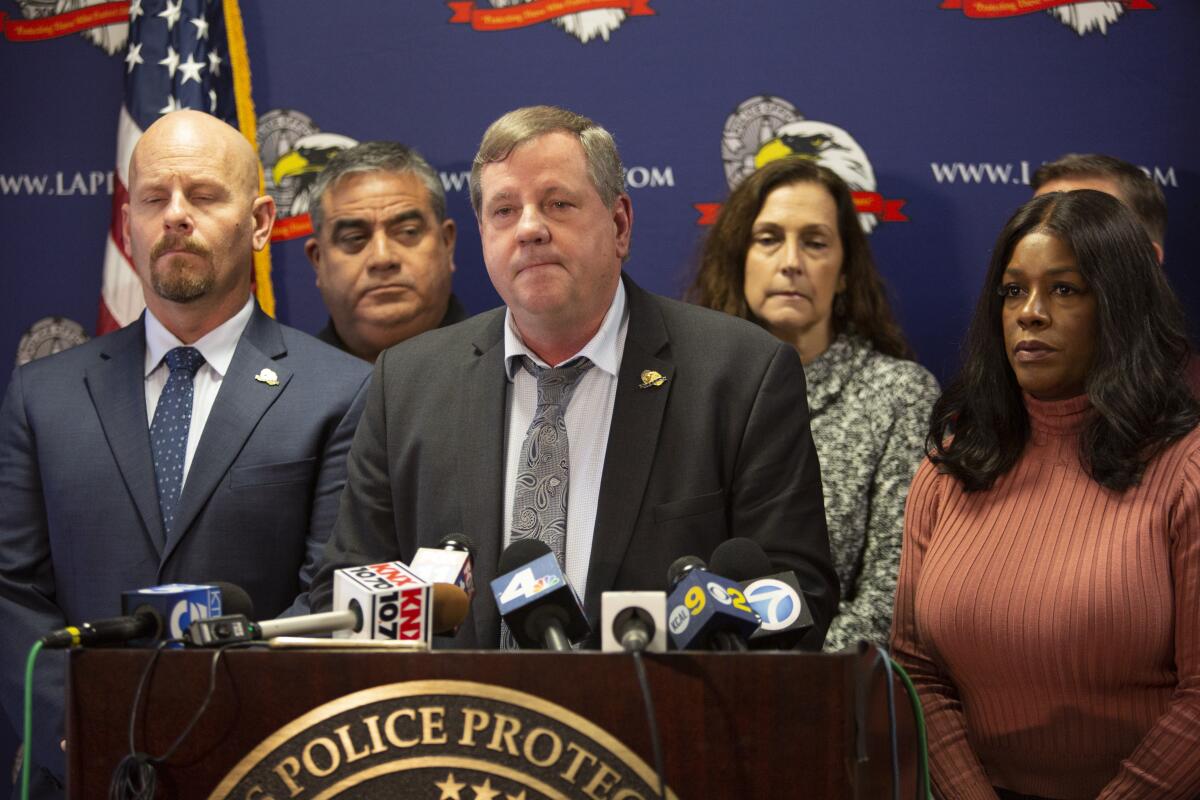LAPD union will not defend officer accused of fondling dead woman’s breasts

- Share via
Leaders of the Los Angeles Police Protective League, the union that represents rank-and-file cops, said it would not criminally defend an officer who allegedly fondled a dead woman’s breasts.
The officer’s body-worn camera recorded the incident.
Lt. Craig Lally, a 39-year officer and union president, said he has never heard of any similar incident in policing. He called the allegation “reprehensible, repugnant” and said, if true, the officer “has no place in law enforcement.”
If the allegations are found to be true, Lally said “the Los Angeles Police Protective League will not defend this officer in a criminal proceeding.”
“This is beyond pale, beyond acceptable,” he said.
The Times first reported the incident on Tuesday.
Department officials initially thought the alleged act was discovered during a random inspection of the officer’s body camera footage, but officials now say a detective investigating the woman’s death found the video.
The officer, who is assigned to downtown’s Central Division, was placed on leave and assigned to home as the department launched an internal investigation.
With board directors standing behind him, Lally said the union wanted to express a sincere apology to the woman’s family.
“We are sorry for the pain this has caused,” Lally said, further calling the allegation an “extreme violation of trust.”
Former L.A. County sex crimes prosecutor Dmitry Gorin said a California health and safety statute makes willful sexual contact with the deceased a felony.
“Every person who willfully mutilates, disinters, removes from the place of interment, or commits an act of sexual penetration on, or has sexual contact with, any remains known to be human, without authority of law, is guilty of a felony,” according to the law.
The touching of breasts repeatedly for sexual gratification would meet that standard, he said.
Gorin, though, said he has not seen such a charge.
The alleged incident occurred when the officer and his partner responded to a call about a possible dead woman in a residential unit, sources said. Once the two officers determined the woman was dead, one officer returned to the patrol car to retrieve something. During that time, the accused officer turned off his body-worn camera and allegedly fondled the woman’s breasts, LAPD officials said.
Although the officer deactivated the camera, a two-minute buffer on the device captured the incident. The department is also investigating the officer’s work history.
Currently, when an LAPD officer turns his or her camera on, it automatically begins saving video and audio starting two minutes prior to the activation. It’s unclear for how long the officer allegedly fondled the dead woman or what triggered him to later activate the camera.
Lally, who worked as a supervisor for 25 years, said the investigation should not take long to complete. “This is not a complex situation,” he said at a news conference at union headquarters.
Last month, The Times reported that the LAPD would start reviewing random police body camera recordings to make sure officers are following guidelines when dealing with the public. Chief Michel Moore reached an agreement last month with the union to inspect body-worn camera recordings that don’t involve arrests or the use of force.
The inspections will allow supervisors to determine whether some officers need additional training or counseling to prevent instances of biased policing, Moore told the Board of Police Commissioners. Supervisors would check to make sure that officers aren’t rude and that they explain their actions when stopping people, he said.
Even prior to the agreement, police leaders could review recordings and discipline officers for misconduct discovered on video. It is standard for police bosses to review recordings from arrests, when force is used or in cases where the public files complaints against officers.
The LAPD began field testing body-worn cameras in 2014 and eventually deployed more than 7,000. The department collects about 14,000 recordings a day and has accumulated recordings totaling more than 2.1 million hours.
More to Read
Sign up for Essential California
The most important California stories and recommendations in your inbox every morning.
You may occasionally receive promotional content from the Los Angeles Times.












